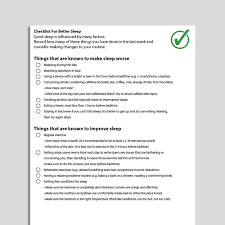Sleep Hygiene Checklist: A Guide to Better Sleep
Getting a good night’s sleep is essential for our overall well-being. It not only allows our bodies to rest and recharge but also plays a crucial role in maintaining our physical and mental health. However, many of us struggle with sleep issues, often due to poor sleep hygiene habits. To help you improve your sleep quality, we have put together a comprehensive sleep hygiene checklist.
- Stick to a Consistent Sleep Schedule: Try to go to bed and wake up at the same time every day, even on weekends. This helps regulate your body’s internal clock and promotes better sleep.
- Create a Relaxing Bedtime Routine: Establish a pre-sleep routine that signals your body it’s time to unwind. This could include activities like reading a book, taking a warm bath, or practicing relaxation techniques such as deep breathing or meditation.
- Create a Comfortable Sleep Environment: Ensure your bedroom is conducive to sleep. Keep the room cool, dark, and quiet. Invest in comfortable bedding and pillows that support your preferred sleeping position.
- Limit Exposure to Electronic Devices: The blue light emitted by electronic devices like smartphones, tablets, and laptops can interfere with your body’s natural sleep-wake cycle. Avoid using these devices for at least an hour before bed or use blue light filters if necessary.
- Avoid Stimulants Before Bedtime: Caffeine and nicotine are stimulants that can disrupt your ability to fall asleep easily. Limit your consumption of these substances, especially in the hours leading up to bedtime.
- Exercise Regularly: Engaging in regular physical activity can promote better sleep quality. However, try not to exercise too close to bedtime as it may increase alertness and make it harder for you to fall asleep.
- Watch Your Diet: Be mindful of what you eat before bed as certain foods can interfere with sleep quality. Avoid heavy, greasy, or spicy meals that can cause discomfort or indigestion. Opt for lighter, sleep-friendly snacks if needed.
- Create a Sleep-Friendly Atmosphere: Use white noise machines, earplugs, or eye masks to block out any disruptive noises or lights that may disturb your sleep. Ensure your mattress and pillows provide adequate support for your body.
- Manage Stress: High levels of stress can significantly impact your ability to fall asleep and stay asleep. Practice stress management techniques such as journaling, mindfulness, or seeking support from a therapist.
- Avoid Napping Late in the Day: If you struggle with falling asleep at night, avoid taking long naps late in the day. If you do need to nap, limit it to a short duration (around 20-30 minutes) and earlier in the day.
By incorporating these sleep hygiene practices into your daily routine, you can improve the quality of your sleep and wake up feeling refreshed and rejuvenated. Remember, consistency is key when it comes to establishing healthy sleep habits. So start implementing these tips today and enjoy the benefits of a good night’s rest!
8 Essential Tips for Optimal Sleep Hygiene
- Establish a consistent sleep schedule
- Avoid caffeine late in the day
- Avoid alcohol before bed
- Exercise regularly
- Create a comfortable sleeping environment
- Limit daytime naps
- Reduce screen time before bed
- Wind down before bedtime
Establish a consistent sleep schedule
Establish a Consistent Sleep Schedule: Key to a Restful Night’s Sleep
One of the fundamental pillars of good sleep hygiene is establishing a consistent sleep schedule. Our bodies thrive on routine, and maintaining a regular sleep-wake cycle can greatly improve the quality of our sleep.
When we go to bed and wake up at the same time every day, including weekends, we help regulate our body’s internal clock, known as the circadian rhythm. This internal clock plays a vital role in determining when we feel alert and awake or when we naturally start to feel sleepy.
By sticking to a consistent sleep schedule, we train our bodies to recognize when it’s time for rest and when it’s time to be active. This regularity helps optimize both the quantity and quality of our sleep.
When we have irregular sleeping patterns or constantly change our bedtime routine, it can disrupt our circadian rhythm. This can lead to difficulties falling asleep, frequent awakenings during the night, or feeling groggy and unrefreshed upon waking.
To establish a consistent sleep schedule, consider the following tips:
- Determine Your Ideal Bedtime: Assess how much sleep you need based on your age and individual requirements. Aim for seven to nine hours of uninterrupted sleep each night.
- Set a Regular Wake-Up Time: Choose a time that allows you to get enough rest while also aligning with your daily commitments. Try to wake up at this time every day, even on weekends.
- Gradually Adjust Your Bedtime: If you currently have an inconsistent sleep schedule or want to change your bedtime, make gradual adjustments over several days or weeks. Shift your bedtime by 15-minute increments until you reach your desired target.
- Create Wind-Down Rituals: Establish pre-sleep rituals that signal your body it’s time for bed. Engage in relaxing activities like reading a book, taking a warm bath, or practicing meditation or deep breathing exercises.
- Minimize Stimulating Activities: Avoid engaging in stimulating activities close to bedtime, such as intense exercise, consuming caffeine or nicotine, or using electronic devices that emit blue light.
Remember, consistency is key when it comes to sleep schedules. While it may be tempting to stay up late on weekends or sleep in, try to maintain your established routine as much as possible. Consistency reinforces your body’s natural sleep-wake cycle and promotes better overall sleep quality.
By prioritizing a consistent sleep schedule, you can improve your sleep patterns and enjoy the benefits of waking up feeling refreshed and energized each morning. So set a bedtime and stick to it – your body will thank you for it!
Avoid caffeine late in the day
Avoid Caffeine Late in the Day for Better Sleep
For many of us, a cup of coffee or tea is an essential part of our daily routine. The caffeine in these beverages acts as a stimulant, helping us feel more alert and awake. However, consuming caffeine late in the day can have a negative impact on our sleep.
Caffeine has a half-life of about 5-6 hours, meaning it takes that long for your body to eliminate half of the caffeine you’ve consumed. This means that even if you drink a cup of coffee at 3 p.m., there will still be a significant amount of caffeine circulating in your system by bedtime.
One of the primary ways caffeine affects sleep is by blocking adenosine receptors in the brain. Adenosine is a chemical that promotes sleep and relaxation. When these receptors are blocked, it becomes harder for us to fall asleep and achieve deep, restorative sleep.
To ensure better sleep hygiene, it’s recommended to avoid consuming caffeine late in the day, especially within 6 hours before bedtime. This includes not just coffee but also other sources of caffeine like energy drinks, certain teas, chocolate, and some medications.
If you find it difficult to cut out caffeine entirely, consider switching to decaffeinated options or herbal teas that do not contain caffeine. Be mindful of hidden sources of caffeine as well, such as some soft drinks or even certain pain relievers.
By avoiding caffeine late in the day, you give your body enough time to process and eliminate it from your system before bedtime. This allows your natural sleep-wake cycle to function optimally and promotes better quality sleep.
Remember that everyone’s sensitivity to caffeine varies, so it’s important to pay attention to how it affects your own sleep patterns. If you notice that even small amounts of caffeine disrupt your sleep, consider reducing or eliminating it from your routine altogether.
Incorporating this simple tip into your sleep hygiene checklist can make a significant difference in your sleep quality and overall well-being. So, the next time you’re tempted to reach for that cup of coffee in the late afternoon or evening, opt for a caffeine-free alternative instead and enjoy a more restful night’s sleep.
Avoid alcohol before bed
Avoid Alcohol Before Bed for a Restful Sleep
Many people turn to a nightcap before bed, thinking it will help them relax and fall asleep faster. However, consuming alcohol close to bedtime can actually disrupt your sleep and leave you feeling groggy in the morning. Here’s why it’s important to avoid alcohol before bed for a restful sleep.
Alcohol may initially make you feel drowsy and help you fall asleep faster, but it negatively impacts the quality of your sleep. It interferes with your sleep cycle, preventing you from reaching the deep, restorative stages of sleep that are essential for waking up feeling refreshed.
One of the main ways alcohol affects your sleep is by disrupting REM (rapid eye movement) sleep. REM sleep is crucial for memory consolidation, learning, and overall cognitive function. When alcohol interferes with REM sleep, you may experience fragmented or shallow sleep, leading to daytime fatigue and reduced concentration.
Additionally, alcohol acts as a diuretic, increasing urine production and potentially causing nighttime awakenings to use the bathroom. This disrupts your sleep continuity and can leave you feeling tired throughout the day.
Moreover, alcohol can worsen conditions like snoring and obstructive sleep apnea. It relaxes the muscles in your throat, narrowing the airway and potentially leading to breathing difficulties during sleep. This can result in frequent awakenings throughout the night, leaving you feeling unrested in the morning.
To promote better sleep hygiene, it’s best to avoid consuming alcohol within a few hours of bedtime. Instead, opt for healthier alternatives like herbal tea or warm milk if you’re looking for something relaxing before bed. These options won’t interfere with your natural sleep patterns and will contribute to a more restful night’s rest.
Remember that establishing a consistent bedtime routine that prioritizes relaxation is key to improving your overall quality of sleep. By avoiding alcohol before bed and incorporating other healthy habits into your routine, you can create an environment conducive to restful sleep and wake up feeling energized and ready to take on the day.
Exercise regularly
Exercise Regularly: A Key to Restful Sleep
When it comes to improving your sleep, regular exercise is a powerful tool. Engaging in physical activity not only benefits your overall health and fitness but also plays a significant role in promoting restful sleep. If you’re struggling with sleep issues, incorporating regular exercise into your routine might be just what you need.
Exercise helps regulate your body’s internal clock, known as the circadian rhythm. By engaging in physical activity, you signal to your body that it’s time for wakefulness during the day and restfulness at night. This synchronization of your body’s natural rhythms can make it easier for you to fall asleep and wake up feeling refreshed.
Moreover, regular exercise has been shown to reduce stress and anxiety levels, which are common culprits of sleep disturbances. Physical activity releases endorphins, the feel-good hormones that promote relaxation and improve mood. By reducing stress levels, exercise can help quiet a racing mind and prepare you for a peaceful slumber.
It’s important to note that the timing of your exercise routine can impact its effects on sleep. While any physical activity is beneficial, exercising too close to bedtime may actually make it harder for you to fall asleep due to increased alertness. Aim to complete your workout at least a few hours before bedtime so that your body has time to wind down and prepare for sleep.
The type of exercise you choose is also a personal preference. Whether it’s going for a run, practicing yoga, lifting weights, or participating in team sports – find an activity that you enjoy and suits your fitness level. Consistency is key here; aim for at least 150 minutes of moderate-intensity aerobic exercise or 75 minutes of vigorous-intensity aerobic exercise per week.
Remember to listen to your body and consult with a healthcare professional before starting any new exercise program, especially if you have underlying health conditions or concerns.
So if you’re looking for a natural and effective way to improve your sleep, lace up your sneakers and get moving! Regular exercise can help regulate your sleep-wake cycle, reduce stress, and promote better sleep quality. Embrace the benefits of physical activity and experience the transformative power it can have on your sleep and overall well-being.
Create a comfortable sleeping environment
Creating a Comfortable Sleeping Environment for Better Sleep
When it comes to getting a good night’s sleep, the environment in which you sleep plays a crucial role. Creating a comfortable sleeping environment can greatly enhance the quality of your sleep and contribute to overall well-being. Here are some tips to help you create an ideal sleep environment:
- Keep it Cool: Your body temperature naturally drops during sleep, so it’s important to maintain a cool room temperature. Aim for around 65-68 degrees Fahrenheit (18-20 degrees Celsius) for optimal comfort.
- Darkness is Key: Ensure your bedroom is as dark as possible when it’s time to sleep. Invest in blackout curtains or blinds to block out any external light sources that may disrupt your sleep, such as streetlights or early morning sunshine.
- Silence or Soothing Sounds: A quiet environment is essential for quality sleep, but complete silence may not be achievable for everyone. If you live in a noisy area or struggle with background noises, consider using earplugs or white noise machines that emit soothing sounds like rain or ocean waves.
- Choose the Right Bedding: Select bedding materials that are comfortable and suitable for your preferences and climate. Opt for breathable fabrics like cotton or bamboo that promote airflow and help regulate body temperature throughout the night.
- Supportive Mattress and Pillows: Your mattress and pillows should provide adequate support for your body’s natural alignment. Choose ones that suit your preferred sleeping position – whether you’re a side sleeper, back sleeper, or stomach sleeper – to ensure proper spinal alignment and reduce discomfort.
- Declutter Your Space: A cluttered bedroom can create mental unrest and make it challenging to relax before bed. Keep your sleeping area tidy by removing unnecessary items and creating a serene atmosphere that promotes relaxation.
- Banish Electronics: Electronic devices emit blue light that can interfere with your body’s production of melatonin, the hormone that regulates sleep. Keep electronic devices like smartphones, tablets, and laptops out of the bedroom or use blue light filters to minimize their impact.
By implementing these tips, you can transform your bedroom into a sleep sanctuary – a peaceful and inviting space that promotes restful sleep. Remember, consistency is key in creating a comfortable sleeping environment. Make these adjustments a part of your nightly routine and reap the benefits of a restorative night’s sleep.
Limit daytime naps
Limit Daytime Naps: A Key Element of Good Sleep Hygiene
While a short daytime nap can provide a quick energy boost and help you feel refreshed, excessive or poorly timed napping can disrupt your sleep pattern and leave you feeling groggy. That’s why limiting daytime naps is an important aspect of maintaining good sleep hygiene.
When we take long or late afternoon naps, it can interfere with our ability to fall asleep at night. This is especially true if you already struggle with insomnia or have difficulty getting a restful night’s sleep. Napping too close to bedtime can reduce your sleep drive and make it harder for your body to naturally wind down when it’s time for bed.
To ensure that your daytime napping doesn’t interfere with your nighttime sleep, here are a few tips:
- Keep Naps Short: If you feel the need for a nap, aim for a short power nap of around 20-30 minutes. This duration allows you to recharge without entering deep sleep stages that may disrupt your nighttime rest.
- Nap Earlier in the Day: Try to schedule your nap earlier in the day, ideally during the mid-afternoon slump when our energy levels tend to dip naturally. Napping too close to bedtime can make it harder for you to fall asleep at night.
- Set an Alarm: To avoid oversleeping during your nap and potentially disrupting your nighttime sleep schedule, set an alarm to wake you up after the desired duration.
- Create a Nap-Friendly Environment: Find a quiet, comfortable space where you can relax and nap without distractions. Consider using earplugs, eye masks, or white noise machines if needed.
- Monitor Your Overall Sleep Quality: If you find that even short naps negatively impact your ability to fall asleep at night or affect the quality of your nighttime sleep, it may be best to avoid daytime napping altogether.
Remember that everyone’s sleep needs are different, and some individuals may benefit from a short nap to help them through the day. However, if you find that napping disrupts your sleep patterns or leaves you feeling groggy, it’s important to adjust your napping habits accordingly.
By limiting daytime naps and maintaining a consistent sleep schedule, you can improve your overall sleep quality and ensure that you’re well-rested throughout the day. Prioritize good sleep hygiene practices to enjoy optimal physical and mental well-being.
Reduce screen time before bed
Reduce Screen Time Before Bed for a Restful Sleep
In today’s digital age, it’s become all too common for many of us to spend our evenings glued to screens – whether it’s watching TV, scrolling through social media, or catching up on work emails. However, this excessive screen time before bed can have a detrimental effect on our sleep quality.
One important tip from the sleep hygiene checklist is to reduce screen time before bed. The blue light emitted by electronic devices like smartphones, tablets, and laptops can disrupt our body’s natural sleep-wake cycle by suppressing the production of melatonin, the hormone that regulates sleep.
By exposing ourselves to screens right before bedtime, we’re essentially sending our brains mixed signals. Instead of winding down and preparing for restful sleep, our minds remain stimulated and alert. This can make it harder for us to fall asleep and result in poorer sleep quality overall.
To improve your chances of getting a good night’s sleep, consider implementing a screen-free period before bed. Ideally, aim to avoid using electronic devices at least an hour before you plan to go to sleep. This gives your brain time to transition into a more relaxed state and allows melatonin levels to rise naturally.
Instead of staring at screens, engage in activities that promote relaxation and prepare you for sleep. You could read a book, listen to calming music or podcasts, practice gentle stretching or yoga, or engage in a soothing bedtime routine such as taking a warm bath.
If you find it challenging to completely eliminate screen time before bed, there are some measures you can take to minimize its impact. Adjust the settings on your devices to enable “night mode” or use blue light filters that reduce the amount of blue light emitted. These features can help mitigate the negative effects of screen exposure on your sleep cycle.
Remember that consistency is key when it comes to establishing healthy habits. By reducing screen time before bed and replacing it with relaxing activities, you’ll be giving your body the best chance to unwind and prepare for a restful night’s sleep. Prioritize your sleep by creating a technology-free sanctuary in your bedroom, and reap the benefits of waking up refreshed and ready to take on the day.
Wind down before bedtime
Wind Down Before Bedtime: A Key Element of Sleep Hygiene
In our fast-paced and busy lives, it’s easy to overlook the importance of winding down before bedtime. However, this simple practice is a crucial element of good sleep hygiene and can significantly impact the quality of our sleep. By taking the time to relax and prepare our minds and bodies for rest, we set the stage for a peaceful and rejuvenating night’s sleep.
Creating a bedtime routine that includes winding down activities helps signal to our bodies that it’s time to transition from the busyness of the day to a state of relaxation. Here are a few effective ways to wind down before bedtime:
- Reading: Engaging in a calming activity like reading can help shift your focus away from daily stressors. Choose something light, enjoyable, or even educational – just make sure it’s not too stimulating or suspenseful that it keeps you awake.
- Gentle Stretching or Yoga: Incorporating gentle stretching exercises or practicing yoga before bed can help release tension in your muscles and promote relaxation. Focus on slow, controlled movements and deep breathing to help calm both your body and mind.
- Mindfulness Meditation: Taking a few minutes to practice mindfulness meditation can be incredibly beneficial for winding down before bed. Find a quiet space, sit comfortably, and bring your attention to your breath or any other anchor point that helps you relax and let go of racing thoughts.
- Warm Bath or Shower: A warm bath or shower can have a soothing effect on both your body and mind. The warm water helps relax tense muscles while also providing an opportunity for self-care and pampering.
- Journaling: Writing down your thoughts, worries, or reflections in a journal before bed can be therapeutic. It allows you to unload any lingering concerns onto paper, freeing up mental space for relaxation.
- Listening to Calming Music or Nature Sounds: Soft instrumental music or nature sounds, such as gentle rain or ocean waves, can create a peaceful ambiance that aids in relaxation. Consider using headphones for a more immersive experience.
Remember, the goal of winding down before bedtime is to create an environment that promotes relaxation and prepares your mind and body for sleep. Experiment with different activities and find what works best for you. Consistency is key, so try to incorporate these practices into your nightly routine to reap the benefits of improved sleep quality.
By making winding down a priority before bed, you set yourself up for a restful night’s sleep and wake up feeling refreshed and ready to tackle the day ahead. So take the time to unwind, prioritize self-care, and enjoy the benefits of a peaceful slumber.




